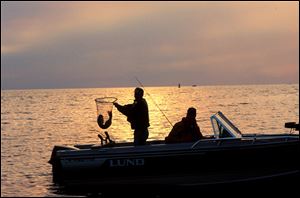
Ohio House OKs Lake Erie water withdrawal
6/23/2011
Teresa Fedor, a Toledo Democrat, says heavy withdrawals of water from Lake Erie could endanger fishing.
COLUMBUS -- It's a pact that either balances Ohio's environment and economy or sacrifices Lake Erie in the name of big business profits.
Regardless, Ohio's attempt to write between the lines of the international Great Lakes-St. Lawrence River Basin Water Compact is flowing at a flood's pace toward Gov. John Kasich's desk.
With a single Columbus Democrat joining Republicans in support, the House voted 60-37 to approve a bill allowing heavy manufacturers, mining operations, power plants, and other businesses to draw up to 5 million gallons of water a day directly from Lake Erie before facing regulation.
"We can do both," said the bill's sponsor, Rep. Lynn Wachtmann (R., Napoleon), owner of a water-bottling company that draws from the watershed.
"We can protect the environment, and we can also make sure that jobs are protected, that economic growth is protected, and that's what [this bill] does," he said.
Pushed by Ohio's business community and opposed by environmental groups, House Bill 231 goes to the Senate, where it is expected to receive rapid consideration next week.
In addition to the threshold on water withdrawals from the lake, the bill would allow a business to withdraw up to 2 million gallons a day if the water is taken from inland sources within the watershed and up to 300,000 if taken from streams that have been designated as high quality.
Under current law, regulation is imposed when a business makes a net withdrawal of 2 million gallons a day within the watershed.
Sen. Teresa Fedor (D., Toledo) argued that heavy withdrawals of water from the rivers and streams that feed Lake Erie could endanger the prized walleye.
"If we kill these watersheds, Lake Erie is dead," she said. "That's what matters most. That's the livelihood and life's blood of the water system so critical to all of us. We might be measuring water withdrawals by averages, but fish don't live based on averages or means. They don't care about anyone carrying around a stick."
The bill implements the regulatory side of the Great Lakes compact that was crafted to unite the region in protecting the freshwater source from poaching by thirsty states and nations. The compact was approved in 2008 by eight states, two Canadian provinces, and Congress.
But the compact left it up to the states to develop standards for "reasonable use" of Great Lakes water. Ohio's proposed thresholds exceed those of all other states.
Only Indiana has thresholds for Lake Michigan and its watershed that rival Ohio's. Michigan has set its limit at 2 million for direct lake withdrawals.
"We don't want to be the state with the highest taxes," said Rep. Terry Boose (R., Norwalk). "We don't want to be the state with the lowest thresholds of whether you can use water out of the lake. … We have the water. Let's use it wisely."
Supporters say the higher numbers are needed to spur economic growth tied to the water supplies and claim there's no evidence the withdrawals would endanger the lake, its tributaries, or aquifers.
Opponents, however, counter that the numbers are arbitrarily high and not based on sound science. They claimed overly generous withdrawals could reduce the quality of the rivers and streams that feed the lake, contribute to the concentration of nutrients from fertilizers and other runoff that fuel algae blooms, and ultimately endanger lake recreation and tourism.
They also argued that the thresholds invite challenge from fellow compact states. If Ohio does not have water-management regulations in place by Dec. 8, 2013, the default threshold of 100,000 gallons a day contained in the compact would apply.
Currently, about 3.4 billion gallons a day are drawn from the lake from nearly 600 businesses, utilities, and municipal water authorities.
Rep. Dennis Murray (D., Sandusky) took issue with a provision that states that any source that removes less than 1.5 percent of the annual runoff of Lake Erie is "irrebutably presumed" not to have an adverse impact on the lake.
He extrapolated that if 67 users of water withdrew just below their maximum allowances, "we could cause Niagara Falls itself to run completely dry, and under this bill the state of Ohio could do nothing about it.
"It is to say that, if enough users lined the banks of the mighty Maumee or Cuyahoga rivers and literally caused them to run backwards from the lake, the state would again be powerless to take any corrective action," he said. "This codified regulatory paralysis is neither good science nor good policy."
Mr. Wachtmann accused the opposition of "fear-mongering."
"We're offering protections that are not out there in Ohio law," he said. "Maybe some on the other side of aisle want to shut down the major manufacturing plants that are the big water users. I don't, because we can have both."
Contact Jim Provance at: jprovance@theblade.com, or 614-221-0496.